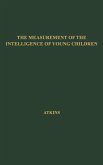The use and misuse of IQ tests has long been a subject of contention in the scientific and social communities, particularly because these evaluations favor intelligence at the expense of other valuable human qualities. This is the first book of its kind to examine the historical development of our modern concept of intelligence and to explore America's fascination with the controversial exams that purport to measure it. Most of us assume that people in every period and in every region of the world have understood and valued intelligence in the same way we do today. Our modern concept of intelligence, however, is actually quite recent, emerging from the dramatic social and scientific changes that rocked the United States during the 19th century. Inventing Intelligence: How America Came to Worship IQ discusses the historical context for understanding the development of the concept of intelligence and the tests used to measure it. The author delves into the intertwined issues of IQ, heredity, and merit to offer a provocative look at how Americans came to overvalue IQ and the personal and social problems that have resulted.
Hinweis: Dieser Artikel kann nur an eine deutsche Lieferadresse ausgeliefert werden.
Hinweis: Dieser Artikel kann nur an eine deutsche Lieferadresse ausgeliefert werden.









